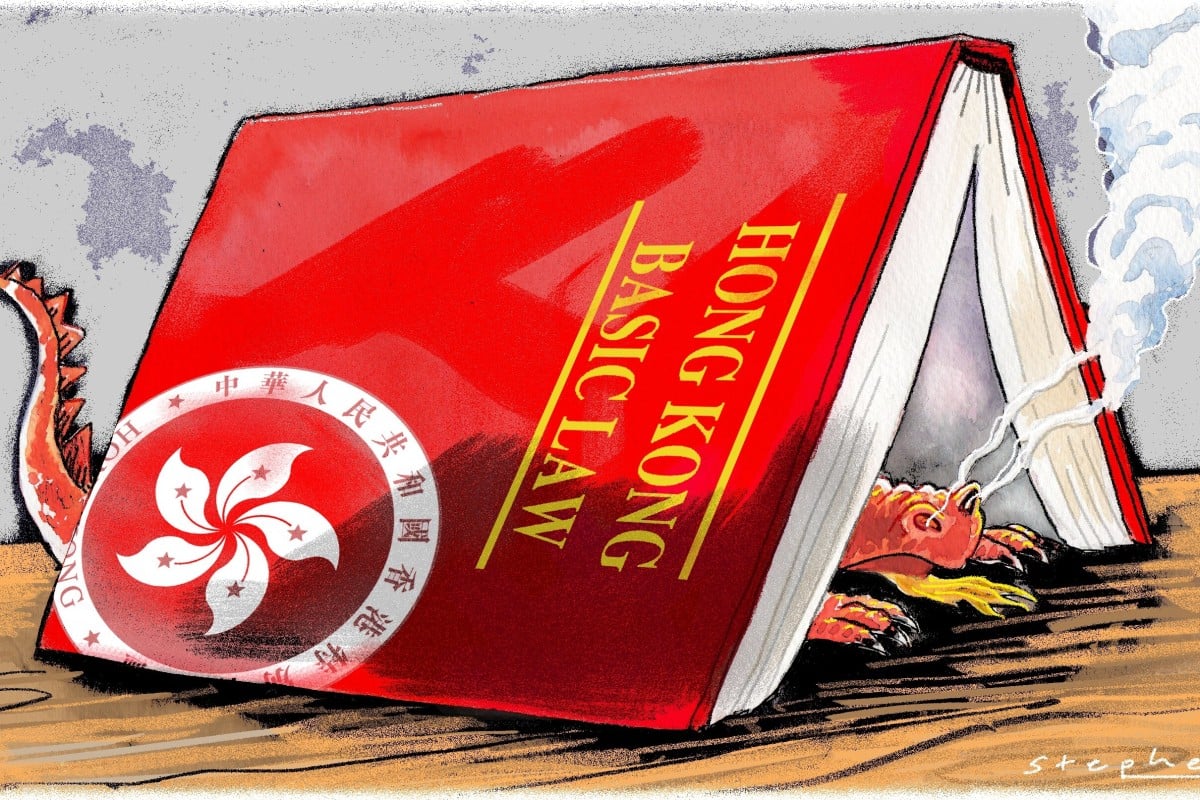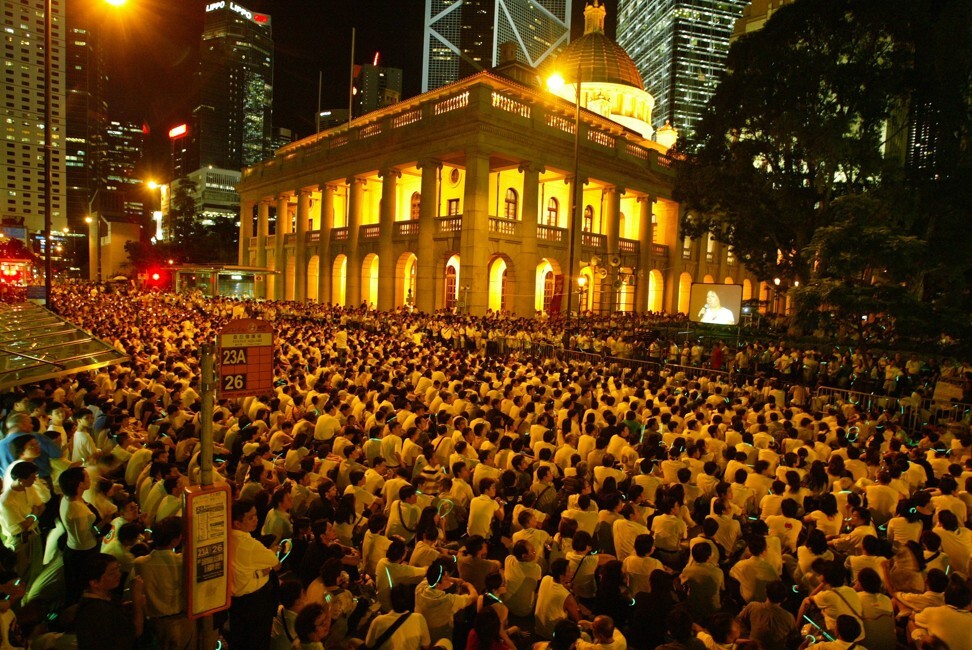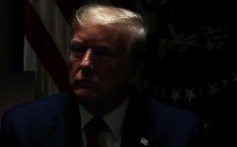From its process of enactment – apparently bypassing the local legislature and ignoring public opinion – to its future implementation and enforcement, the law is incompatible with the city’s common law tradition
Hong Kong’s courts will be severely tested in trying to uphold the rule of law
Michael C. Davis
Published: 9:00am, 28 May, 2020

Illustration: Craig Stephens
With the expected passage of the National People’s Congress resolution on national security this week, mainland and Hong Kong officials assure us that the proposed law will be narrowly drafted and pose no threat to basic freedoms and the rule of law in Hong Kong. This assurance should be doubted.
The claim that public officials are reliable people who will only go after the bad guys underlies the People’s Republic of China’s tradition of rule by law. It presumes that a society of laws is one where officials issue the right directives and everyone else is bound to follow them. Such use of law as only an instrument of control is not the rule of law as known in Hong Kong.
Rather, the rule of law primarily aims to maintain public order by ensuring that officials comply with properly enacted laws in carrying out their duties. For common law Hong Kong, under the Basic Law, such laws should be the product of a proper legislative process with enforcement and oversight in the ordinary courts.
This is not what is envisioned with regard to the proposed national security law. The NPC resolution runs afoul of a number of Basic Law requirements. First, the process of enactment raises grave concern. The NPC has directed this mainland-drafted national security law be added to Annex III of the Basic Law and then directly promulgated for application in Hong Kong.
The central government claims that the local
disorder on the streets associated with the protests represents a threat to national security. Its decision to take matters into its own hands runs afoul of the requirement in
Basic Law Article 14 that, “The government of the Hong Kong Special Administrative Region shall be responsible for the maintenance of public order in the Region”.
Basic Law Article 18 further provides, “National laws shall not be applied in the Hong Kong Special Administrative Region except for those listed in Annex III”, with further provision that the law being listed must “be applied locally by way of promulgation or legislation by the Region”.
here have been reports that Beijing may promulgate the law directly on its own, in violation of this provision requiring the SAR to do so. More important is the requirement in the same article that laws enacted under this provision “shall be confined to those relating to defence and foreign affairs as well as other matters outside the limits of the autonomy of the [SAR] as specified by this law”.
Basic Law Article 23 clearly places the enactment of such laws on national security, secrecy and the like within the scope of local autonomy, providing explicitly that such laws should be enacted by the Hong Kong SAR “on its own”.
Beijing officials are fond of saying that, since Hong Kong did not enact a law under Article 23, then Beijing has to step in and do so. On close examination, this is a fallacious argument. In 2003, the Hong Kong government proposed a draconian version of such a law that was widely and rightly condemned by the masses of Hong Kong people.

On July 9, 2003, about 50,000 people gathered outside the then Legislative Council building to voice their disapproval of the Tung Chee-hwa government’s handling of the proposed Article 23 legislation, about a week after half a million people marched on the streets to oppose the law. Photo: SCMP
There was no reason a law covering the areas addressed in Article 23 could not have been proposed through a proper law reform process. In the Hong Kong tradition, such an approach would likely include submissions to the Law Reform Commission with proper public consultation.
Such reform should have aimed to improve on existing laws in this area, with high regard for basic rights. Instead, the central government is now seeking to force through a law that aims to control or intimidate its critics.
Why the West is so focused on Hong Kong
27 May 2020

On a substantive level, an even greater concern is the problem of fitting this mainland-drafted national security law into Hong Kong’s rule-of-law-based system. Claims by mainland officials that the law will be narrowly drawn are hardly reassuring, given the extreme application of national security laws to
silence opposition on the mainland.
That the law purports to broadly reach acts against state power suggests it might even be applied to innocuous actions such as blockading local government offices, as is common to protests in Hong Kong’s dense urban environment.
A number of other limitations have become apparent. Basic Law
Article 22 provides that “no department of the central people’s government … may interfere in the affairs” which Hong Kong administers on its own. As already noted, this would encompass both public order and Article 23 legislation.
The fourth item of the NPC resolution, to the contrary, provides for
setting up in the Hong Kong SAR the relevant national security agencies of the central government. The compatibility of such mainland institutions with an open society in Hong Kong raises grave concern.
The sixth item of the NPC decision ominously provides that the Standing Committee is authorised to establish a comprehensive legal system and execution mechanism to “precisely prevent, stop and punish any behaviours” that pose a serious risk to national security, as it relates to secession, sedition, terrorism and interference by foreign countries or outside influences. The scope of intrusion on Hong Kong’s autonomy, rule of law and human rights is breathtaking.
This also poses a severe challenge to the Hong Kong judiciary and its maintenance of the rule of law. How will such prevention, stoppage and punishment be delivered? Will the Hong Kong courts be able to exercise judicial review over both the text and the application of this law, as they do over all other laws in Hong Kong?
Even if they are given such review power in the normal practice, one can easily imagine the severe pressure on judges reviewing this law and the acts of mainland officials under it. Some discussion has worryingly even suggested the creation of a special tribunal in this area.
We must add to these concerns the chilling effect such a legal regime will have on freedom of speech and the press in Hong Kong. Will journalists and public citizens dare to speak out against Beijing’s intrusions and decisions in these areas?
Will our civil society dare to interact with the global discourse, international bodies, NGOs or other critical voices in such areas as human rights, public health or the environment if they see local activists who do hauled off to jail?

Michael C. Davis
a former professor of law at the University of Hong Kong, is a global fellow at the Woodrow Wilson International Centre in Washington, DC and a senior research scholar at the Weatherhead East Asia Institute at Columbia University
Michael C. Davis is professor of law and international affairs at the O.P. Jindal Global University in India and a resident fellow at the Woodrow Wilson International Centre in Washington, DC. A professor in the Law Faculty at the University of Hong Kong until late 2016, he continues as a non-resident senior fellow in the university’s Centre for Comparative and Public Law.
No comments:
Post a Comment